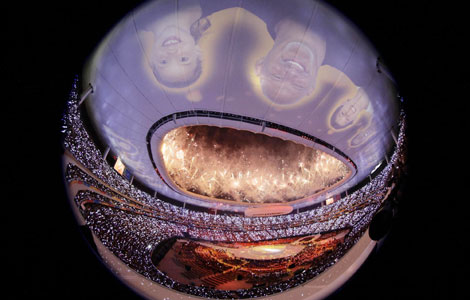Policy shift unlikely despite ease in inflation
Updated: 2011-10-14 20:38
(Xinhua)
|
|||||||||||
"China is facing long-term pressure from imported inflation," he said, noting that the debt crisis, low interest rate and excessive liquidity issues in developed countries are bringing inflation risks to the whole world.
Liu Ligang, director of economic research department of ANZ Greater China, said China's battle against inflation has not yet seen remarkable results.
China's inflation rate is expected to experience significant growth early next year due to the currently high monthly CPI growth, he said.
Therefore, it is too early for the Chinese government to loosen its monetary policy, Liu added.
To curb soaring inflation, the People's Bank of China (PBOC), the country's central bank, has raised the benchmark interest rate three times this year and increased the reserve requirement ratio six times.
China's Producer Price Index (PPI), a major measure of inflation at the wholesale level, rose 6.5 percent year-on-year in September, down from 7.3 percent in August.
China's gross domestic product rose by 9.5 percent year-on-year in the second quarter of 2011, tapering off slightly from the 9.7-percent growth posted in the first quarter and 9.8 percent in the fourth quarter of last year.
Economic growth data for the third quarter is scheduled to be released by the NBS on Tuesday.
Qu Hongbin, HSBC's chief China economist, said he expects that China's economic growth is "still holding up well," and the central bank will maintain its monetary policy over the coming months.
Even if a renewed global recession were to hit China, it is wrong to expect a turnaround in monetary policy, considering elevated inflationary pressures and China's relatively lowered dependence on external demand, he said in a note to the press.
"Moreover, the lesson of overstimulation from the last round of stimulus is still fresh," said Qu.
China's recent decision to provide more credit and fiscal support to small enterprises shows that the government is targeting eases in policies toward striking a better balance between inflation and growth, said economists.
Liu Ligang said he expects the central bank to cut the reserve requirement ratio for medium- and small-sized banks to better support the development of small enterprises.
However, China's policymakers should not ignore the worsening issue of negative real interest rates, which would threaten the security of China's financial system, he said.
The PBOC will probably have another interest rate hike this year to ensure financial security, but it is very likely to be conducted on the deposit rate, Liu said.
Hot Topics
Libya conflict, Gaddafi, Oil spill, Palace Museum scandal, Inflation, Japan's new PM, Trapped miners, Mooncake tax, Weekly photos, Hurricane Irene
Editor's Picks

|

|

|

|

|

|






